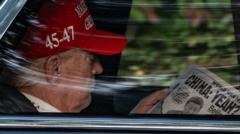The imposition of tariffs has heightened economic tensions globally, with significant protests emerging against Trump's policies.
Trump Calls for Resilience Amidst New Tariffs and Market Instability

Trump Calls for Resilience Amidst New Tariffs and Market Instability
President Trump urges Americans to remain resilient as a 10% tariff begins to shake global markets.
The US has officially enacted a 10% "baseline" tariff on all imports, with President Donald Trump encouraging citizens to "hang tough" as financial markets react with volatility. The measure is set to impact numerous countries including the UK and France, which are currently assessing their responses. Trump's tariffs have particularly affected China, prompting Beijing to announce substantial retaliatory measures.
On Friday, US stock markets experienced a dramatic downturn, with all major indexes dropping over 5%—the worst decline for the markets since 2020. In the face of this turmoil, Trump characterized the situation as an "economic revolution" that the US would ultimately win, providing a sense of optimism in a post on Truth Social. He urged the population to remain steadfast, suggesting that the challenges faced today would lead to historic achievements.
Internationally, markets felt the shakeup, with the UK's FTSE 100 plunging almost 5%, marking its steepest drop in five years, as Asian and European exchanges mirrored similar declines. Elon Musk, a vocal supporter of Trump's administration, suggested a future vision of a "zero-tariff situation," potentially paving the way for a free-trade zone between Europe and North America.
In response to the tariffs, British Prime Minister Sir Keir Starmer engaged in discussions with global leaders, including French President Emmanuel Macron. Both emphasized the need for collaboration and indicated that a trade war would not benefit any nation involved. Starmer expressed concerns about the broader economic implications, particularly those affecting Southeast Asia.
China's economy, the second-largest in the world, has borne the brunt of the newfound tariffs, with Beijing's response involving a 34% tariff on US imports, matching the US's rates on Chinese goods. Additionally, the Chinese government has filed a formal complaint against the US tariffs, calling for an end to what it describes as hostile trade tactics that impede China's economic rights.
Nationwide, approximately 1,200 protests against Trump's policies were anticipated on Saturday, signaling one of the largest backlash events since the announcement of recent government policy changes. The White House has yet to issue a commentary regarding these demonstrations, though protests were evident in Washington DC and various cities across the nation.
Among the many businesses affected by these tariffs, Jaguar Land Rover declared that it would "pause" shipments to the US while it navigates the implications of new trading conditions. The unfolding trade dynamics between the US and its global partners continue to raise significant questions about future economic interactions.
On Friday, US stock markets experienced a dramatic downturn, with all major indexes dropping over 5%—the worst decline for the markets since 2020. In the face of this turmoil, Trump characterized the situation as an "economic revolution" that the US would ultimately win, providing a sense of optimism in a post on Truth Social. He urged the population to remain steadfast, suggesting that the challenges faced today would lead to historic achievements.
Internationally, markets felt the shakeup, with the UK's FTSE 100 plunging almost 5%, marking its steepest drop in five years, as Asian and European exchanges mirrored similar declines. Elon Musk, a vocal supporter of Trump's administration, suggested a future vision of a "zero-tariff situation," potentially paving the way for a free-trade zone between Europe and North America.
In response to the tariffs, British Prime Minister Sir Keir Starmer engaged in discussions with global leaders, including French President Emmanuel Macron. Both emphasized the need for collaboration and indicated that a trade war would not benefit any nation involved. Starmer expressed concerns about the broader economic implications, particularly those affecting Southeast Asia.
China's economy, the second-largest in the world, has borne the brunt of the newfound tariffs, with Beijing's response involving a 34% tariff on US imports, matching the US's rates on Chinese goods. Additionally, the Chinese government has filed a formal complaint against the US tariffs, calling for an end to what it describes as hostile trade tactics that impede China's economic rights.
Nationwide, approximately 1,200 protests against Trump's policies were anticipated on Saturday, signaling one of the largest backlash events since the announcement of recent government policy changes. The White House has yet to issue a commentary regarding these demonstrations, though protests were evident in Washington DC and various cities across the nation.
Among the many businesses affected by these tariffs, Jaguar Land Rover declared that it would "pause" shipments to the US while it navigates the implications of new trading conditions. The unfolding trade dynamics between the US and its global partners continue to raise significant questions about future economic interactions.




















